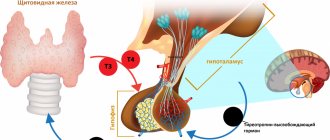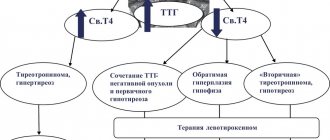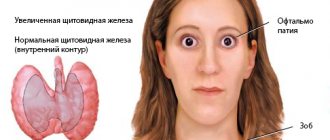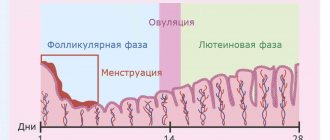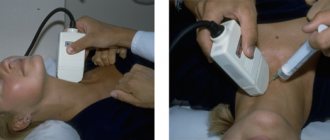Thyroid hormones regulate metabolism, cell growth and division, and the activity of internal organs. Both deficiency and excess of hormones have a negative impact on human health. Ignoring symptoms and self-medicating is dangerous to health and life. If you notice signs of thyroid dysfunction, consult a doctor. If you are in Anapa, go to the diagnostic department.
The thyroid gland and its hormones
The thyroid gland and its hormones, together with the nervous and immune systems, take part in the coordination and regulation of the work of all human organs (heart, brain, kidneys, etc.).
In a coordinated “orchestra” of signals, nerve impulses and biological substances, thyroid hormones play the role of the “main violin”. The reason for the special importance of thyroid hormones for the body is that they are needed by all tissues and every cell. Simply put, it is impossible to exist without them.
The role of the thyroid gland is so significant that its study is separated into a separate discipline - thyroidology, and after the accident at the Chernobyl nuclear power plant and Fukushima, it is under close attention.
The problem of imbalance of thyroid hormones has been known for many centuries. Ancient Roman doctors were the first to draw attention to the increase in its size during adolescence and pregnancy. Before our era, China already knew how to prevent the appearance of goiter - an enlarged gland - by eating seaweed. In the Renaissance, a rounded and swollen neck was a sign of female attractiveness, which Rembrandt, Durer, and Van Dyck emphasized in their paintings. A nervous and excitable disposition, as a result of an excess of thyroid hormones, was in fashion in the 17th century in Spain. Calm and graceful slowness was valued by the aristocrats of Switzerland, but they did not suspect that the reason for this was a deficiency of iodine, necessary for the thyroid gland.
How often do you need to get tested for TSH, who and where?
TSH analysis is especially important for children and women when planning pregnancy, as well as during it. Any suspicion of hormonal disorders associated with the thyroid gland requires testing using hormone tests, including TSH.
It is imperative to monitor TSH for those who have already had problems with the thyroid gland before. According to the recommendation of the American College of Physicians, TSH testing should be done regularly for all women over 50 years of age, since this is a risk group for hormonal disorders due to the onset of hormonal changes in the body (entry into menopause).
You can get tested for TSH in almost any clinic or laboratory. However, only at LAB4U the affordable price of a TSH blood test is combined with high quality and accurate results.
Structure of the thyroid gland
The thyroid gland is located on the front of the neck, just below the Adam's apple. The ancient Roman physician Galen first described the gland as a separate organ, and it received its name much later in the 17th century. The name of the gland comes from the Greek words “thyreos” - shield and “idos” - view, i.e. an organ that looks like a shield. The international name for this internal secretion organ is the thyroid gland. The shape of the thyroid gland resembles a butterfly or a horseshoe; it has three main parts - two lateral lobes and an isthmus. Every third person has another non-permanent lobule - pyramidal.
The size of the gland can vary significantly even in the same person, depending on the activity of its functioning. Gender, age, climate, medication use and, of course, diet largely influence the size and amount of gland hormones. Due to the tight connection with the larynx, its position can change, it rises and falls when swallowing, moves to the side when turning the head in different directions, which is visible to the naked eye
The structure of the thyroid gland is quite complex. Under a microscope, it is noticeable that it consists of many vesicles - follicles. Along the edges of the follicles there are cells - thyrocytes, and inside the follicle there is a thick watery liquid - colloid. Thyrocytes synthesize hormones, and they accumulate in a colloid for immediate release into the blood when needed.
In the walls of the follicles between the cells, as well as between the follicles themselves, there are larger, lighter parafollicular cells (C-cells), which produce the hormone calcitonin, which is involved in the regulation of calcium and phosphorus metabolism. It inhibits the removal of calcium from bones and reduces calcium levels in the blood.
Norms for TSH
It is important to remember that TSH fluctuations are especially individual for each person at different ages.
Therefore, an accurate interpretation of TSH tests (resolving the issue of whether TSH is low or increased) should only be carried out by a medical specialist. On average, the norm for TSH levels in adults is 0.23-4.90 mIU/l. For children aged 7-12 years, the TSH norm, on average, is in the range of 0.61-5.20 mU/l. For children under 6 years of age, the TSH norm ranges from 0.45-3.6 mU/l.
The average value and norm of TSH during pregnancy is 0.2-3.5 mU/l. In pregnant women, during some periods, it is considered normal when the TSH level is elevated to 5.6 mU/L.
Thyroid hormones
The main two hormones produced by the thyroid gland are triiodothyronine (contains three iodine molecules) and tetraiodothyronine or thyroxine (contains four iodine molecules). Thyroid hormones are abbreviated as T3 and T4. In the cells and tissues of the body, T4 gradually turns into T3, which is the main biologically active hormone that directly affects metabolism.
The formation of thyroid hormones is associated with a specific protein, thyroglobulin. Thyroglobulin serves as a reserve form of thyroid hormones and is located inside the colloid.
In the preparation of thyroid hormones, two essential components are required - iodine and the essential amino acid tyrosine. To form one T4 molecule, four iodine molecules are needed, while T3 requires only three. Without iodine, hormone synthesis stops completely. This is why it is so important to prevent iodine deficiency in food. Tyrosine enters the body with food; it is a precursor in the formation of not only thyroid hormones, but also adrenaline, melanin, and dopamine.
There are four stages in the process of synthesis of thyroid hormones:
1. Absorption of iodine by the thyroid gland. Its concentration in the gland is 30-40 times higher than in the blood.
2. Activation of iodine, which makes it possible for it to bind to the amino acid tyrosine molecule.
3. Condensation with the formation of hormones - thyroxine and triiodothyronine and their accumulation in the composition of thyroglobulin in the form of a colloid.
4. Release of formed hormones into the blood under the influence of TSH.
Thyroid hormones are very small in size and must be bound to transport proteins before entering the blood so as not to be “washed out” of the body by the kidneys. The level of free hormones is 0.03% of the total; they provide all the effects of thyroid hormones. In tissues, thyroxine (T4) is converted into triiodothyronine (T3) and the biological effect of hormones is 90% due to T3.
Hypothyroidism and its symptoms
The most common chronic deficiency of thyroxine results in hypothyroidism. If the deviation is not diagnosed in time and you do not start taking thyroxine, both reversible and irreversible complications are possible.
Early symptoms of hypothyroidism:
- weight gain;
- decreased body temperature, feeling cold;
- deterioration of memory and attention, decreased intelligence;
- daytime drowsiness, weakness;
- depression, causeless melancholy;
- low blood pressure;
- B12 deficiency anemia.
Hypothyroidism can cause infertility, and this is true for both women and men. People with low production of thyroid hormones often have elevated cholesterol and may experience decreased bone density.
Primary hypothyroidism (its share is more than 80%) is congenital due to underdevelopment or absence of the thyroid gland. But in most cases it occurs against the background of autoimmune thyroiditis, a chronic inflammatory disease in which the body’s own immune system begins to destroy thyroid cells.
Autoimmune thyroiditis can be genetic or begin to develop as a result of iodine deficiency, unfavorable environmental conditions, stress, or severe infectious diseases. A damaged or weak gland does not produce enough hormones. Dysfunction may worsen with age.
Subacute thyroiditis, a complication after viral diseases, also destroys the structure of the thyroid gland and leads to hypothyroidism.
Hypothyroidism of the secondary and tertiary types develops due to various inflammatory, destructive or traumatic disorders in the pituitary gland, leading to a significant reduction in thyroid hormones.
Peripheral hypothyroidism is the most rare and is thought to be caused by resistance of target tissues (brain, pituitary gland, heart, bones, liver) to thyroid hormones.
It is impossible to force the body to produce the required amount of thyroxine, but it is possible to adjust their amount with hormone replacement therapy. As a rule, medication is taken for life, but is adjusted based on age.
Hypothalamus - pituitary gland - thyroid gland
The release of thyroid hormones is controlled by two “superior” endocrine glands. The area of the brain that connects the nervous and endocrine systems is called the hypothalamus. The hypothalamus receives information about the level of thyroid hormones and secretes substances that affect the pituitary gland. The pituitary gland is also located in the brain in the area of a special depression - the sella turcica. It secretes several dozen hormones that are complex in structure and action, but only one of them acts on the thyroid gland - thyroid-stimulating hormone or TSH.
The level of thyroid hormones in the blood and signals from the hypothalamus stimulate or inhibit the release of TSH. For example, if the amount of thyroxine in the blood is small, then both the pituitary gland and hypothalamus will know about it. The pituitary gland will immediately release TSH, which activates the release of hormones from the thyroid gland.
Low temperature and stress lead to more active release of TSH and, accordingly, an increase in the amount of T3 and T4 in the blood. During sleep, TSH is practically not formed.
The triple axis of interaction between the hypothalamic-pituitary-thyroid system allows not only the higher glands to know about the amount of thyroid hormones, but also the nervous system, which directly depends on and influences hormonal regulation.
Action of thyroid hormones
Unlike most hormones, which act only on certain target cells (for example, for estradiol these are the genitals), thyroid hormones are necessary for normal functioning of all tissues without exception. Penetrating into the cell, the hormone is sent to the nucleus, where it binds to certain areas on the chromosomes and stimulates a complex of reactions, which leads to the activation of oxidation and reduction processes.
The effect of thyroid hormones on the body:
- increased heat release
- activation of protein synthesis necessary for the construction of new cells
- proper growth and development of the central nervous system, especially the brain (especially important for children)
- strengthening the processes of reabsorption in the intestine, the formation of glucose from proteins and fats, increasing the level of glucose in the blood
- stimulation of fat breakdown in fat depots, which leads to weight loss
- anabolic effect – body growth, maturation, bone differentiation
- red blood cell formation
- normal development of the genital organs and the release of sex hormones.
Why is TSH low?
A decrease in TSH concentration in the blood may indicate:
• Deterioration of the pituitary gland function – after brain injuries, with hereditary diseases, infections, after severe bleeding;
• Hypothyroidism is a deterioration in the normal functioning and function of the thyroid gland, which may be associated with a tumor, iodine deficiency, protein deficiency, heredity, exposure to radiation and other reasons;
• Psychological stress;
• Abuse of thyroid hormones;
• Sheehan syndrome – partial death of cells in the pituitary gland in women after childbirth.
How many hormones should there be?
There must be enough hormones to ensure normal functioning of the body. Tests can accurately determine the level of thyroid hormones. The “gold standard” among laboratory methods for analyzing thyroid hormones is radioimmunoassay. But due to the difficulties of using radioactive isotopes, most laboratories conduct tests using the ELISA (enzyme-linked immunosorbent assay) method.
The amount of thyroid hormones depends on:
— the intensity of signals coming from the brain and regulating the functioning and level of thyroid hormones
- the number of working cells in the gland itself
- the presence of a sufficient amount of iodine, which is necessary for the synthesis of hormones.
Normal thyroid hormone levels:
— total triiodothyronine T3 — 1.2-2.8 mIU/l
— total thyroxine T4 — 60.0-160.0 nmol/l
— free triiodothyronine FT3 — 2.5 — 5.8 pmol/l
— free thyroxine FT4 — 11.5-23.0 pmol/l
— thyroid-stimulating hormone TSH, TSH — 0.17-4.05 mIU/l
— thyroglobulin Tg — less than 50 ng/ml
When performing tests for thyroid hormones, not only their quantity is assessed, but also antibody levels. When there are disturbances in the immune response system, antibodies begin to form not only against foreign organisms, but also against “native” tissues. Some of these antibodies disrupt the functioning of the thyroid gland and the action of its hormones. The most common are TSH receptor Ab, anti-thyroglobulin antibody (ATG) and anti-thyroid peroxidase antibody (anti-ATPO).
Antibodies to TSH receptors are similar in structure to TSH and their attachment to receptors on the thyroid gland leads to the active release of T3 and T4. Antibodies to thyroglobulin appear in autoimmune Hashimoto's thyroiditis and pregnancy. Monitoring their levels in the blood indicates the activity of inflammation. Anti-ATPO - antibodies to thyroperoxidase (AMC, antibodies to the microsomal fraction) lead to the destruction of the gland and the release of hormones into the blood.
A condition in which there is enough thyroid hormone for the body is called euthyroidism.
General indicators, decoding
A complete picture of the state of the body and hormonal levels can be obtained by passing one of the following types of tests:
Thyroid hormones:
- Free T4 is one of the most important biologically active substances of the thyroid gland, which is responsible for transporting protein compounds and maintaining their optimal balance in the body. The normal plasma level for a healthy person is from 10 to 22 mmol/l. An excess indicates somatic or mental illnesses, lipemia. Deficiency - about pregnancy, poor nutrition, heavy physical activity, use of a number of medications.
- TSH – directly affects the thyroid gland and is responsible for the circulation of its components. The norm for an absolutely healthy person is from 0.4 to 4 mU/liter. An excess indicates adrenal insufficiency, complex non-thyroid pathology, etc. Low level – about thyrotoxicosis, cortisol imbalance, etc.
- T3 general - needed to stabilize the peripheral endocrine glands. The norm is 1.3 – 2.7 nmol/l. An excess of the hormone indicates pregnancy, taking drugs or estrogen. Disadvantage - about gastrointestinal pathology, acromegaly, hemolysis, starvation and other disorders.
- Total T4 is one of the main bioactive substances of the thyroid gland. Correct values are from 59 to 160 nmol/l. Going beyond these numbers to a greater extent can indicate obesity, the presence of hepatitis, pregnancy, etc., to a lesser extent - about starvation, excessive physical activity, kidney and gastrointestinal diseases.
- Free T3 – stimulates oxygen circulation in soft tissues. The normal range is from 2.6 to 5.6 pmol per liter. Exceeding the indicators indicates hyperthyroidism, toxicosis, a deficiency indicates peripheral vascular resistance syndrome, taking iodine-containing medications.
- Antithyroglobulin antibodies (AT-TG) help identify some autoimmune diseases. The normal value ranges from 0 to 4.11 U/ml.
- TSH is one of the main functional elements of the thyroid gland. The norm for a healthy person ranges from 258 to 574 nmol/liter. A higher reading may indicate pregnancy, hepatitis or hypoproteinemia.
Sex hormones:
- Estradiol is an active component in the blood of women, which is responsible for the maturation of germ cells and affects the proper development of the fetus during pregnancy. The norm varies depending on the life cycle: from 200 to 286 pm/l (for women in the follicular phase), from 52 to 136 pm/l (for women during menopause) and from 441 to 576 (girls in the luteal phase). An excess indicates possible tumors on the ovaries, a deficiency indicates a failure in the release of gonadotropic hormones.
- Testosterone - directly affects the growth of muscle mass, strengthening bones, and the formation of sexual characteristics. Indicators range from 2 to 10 ng/ml in men and from 0.2 to 1 in women
- Progesterone appears in the body after the formation of the egg. The pregnancy hormone, as it is also called, is responsible for the stability of the development of the intrauterine fetus. The norm is from 22 to 30 nm/l in the luteal phase, 1 – 2.3 nm/l in the follicular phase, 1 – 1.8 during menopause. If the value is higher than normal, then this may indicate pathological processes in the adrenal cortex, if less, it may indicate ovarian sclerosis.
Pituitary hormones:
- ACTH is responsible for the release of bioactive substances in the adrenal cortex. Correct values are up to 50 pg/ml. If more, hyperplasia is possible, less - adrenal insufficiency, tumor.
- Prolactin is responsible for stimulating lactation in women and the functioning of the prostate in representatives of the stronger half. For the latter, the norm is from 100 to 266 µg/l, for women of childbearing age from 129 to 539 µg/l, for women in menopause – from 106 to 289 µg/l.
- Growth hormone is responsible for the development of bone and muscle mass and other important organs. The norm is up to 10 ng/ml. Elevated levels indicate acromegaly or gigantism, while low values indicate pituitary dwarfism.
- LH – ensures the complete maturation of the egg in women and sperm in men. The norm for guys is from 2.12 to 4 mIU/ml, for girls, depending on the menstrual cycle, from 1.55 to 53 mIU/ml. Deviation in one direction or another is a sign of various dysfunctions of the gonads.
Adrenal hormones:
- Adrenaline and norepinephrine are responsible for the rhythm of the heart muscle, pressure, blood vessels, motility, and form glucose levels. Correct values are from 1.9 to 2.45 nm/l and from 0.6 to 3.22, respectively. An excess indicates jaundice, renal pathologies, a deficiency indicates myasthenia gravis or damage to the hypothalamus.
- Cortisol – responsible for susceptibility to allergic reactions, systematizes the production of antibodies. The norm is from 229 to 749 nm/l. If the readings are lower, there is a possibility of Addison's disease or adrenal disease; exceeding the norm indicates an adenoma or cancer.
- Aldosterone is an important hormone responsible for the balance of water and salt. The correct value ranges from 30 to 172 pg/ml. Deficiency is a sign of thrombosis, poor nutrition, arterial embolism. An excess may indicate a tumor in the adrenal glands or hyperplasia.
Not enough thyroid hormones
Reduced function of the thyroid gland - hypothyroidism, occurs when there is a deficiency of iodine or the intake of substances that disrupt the formation of hormones. Rarer causes of hypothyroidism are the use of certain drugs (for example, cordarone), removal of the gland as a result of tumors or deficiency of TSH secretion. Hypothyroidism in childhood leads to growth retardation, disproportionate growth, mental retardation, and cretinism. Hypothyroidism in adults is called myxedema.
Manifestations of thyroid hormone deficiency:
- weight gain that is not reduced by diet and exercise
- general weakness, constant fatigue, fatigue
- constantly depressed mood
- menstrual irregularities, infertility
– low body temperature (35.6-36.3ºС)
- dry, swollen skin, itching, dandruff that does not disappear when using medicated shampoos, changes in nails
- constant constipation
- constant swelling of the legs, feet, puffiness of the face
- low blood pressure, low heart rate
- inability to warm up even in a warm room
- pain in muscles and joints
- deterioration of memory and reaction speed
One of the forms of hypothyroidism is endemic goiter, which develops when there is insufficient iodine intake in the body. This situation is typical for areas where its level in water and soil is low. Switzerland was one of the first countries to introduce mandatory iodization of salt, sunflower oil and bread back in 1922. There are no cases of hypothyroidism in Switzerland today. Areas of iodine deficiency in Russia are the North Caucasus, the Urals, Altai, the Siberian Plateau, the Far East, the Upper and Middle Volga region, in the North and Central regions of the European part of the country. In Ukraine, these are Volyn, Transcarpathian, Ivano-Frankivsk, Lviv, Rivne, Ternopil regions.
During accidents at nuclear power plants, large amounts of radioactive iodine are released into the air. Radioactive iodine can irradiate the gland from the inside and integrate into thyroid hormones, which leads to active tumor growth. Carrying out iodine prophylaxis helps prevent the entry of radiation iodine into the thyroid gland by replacing it with a stable isotope.
When is a TSH test needed?
An analysis to determine TSH norms is needed in the following cases:
• Suspicion of hypofunction of the thyroid gland - lethargy, drowsiness, dry skin, constipation, chilliness, etc. An examination can help understand the cause of decreased function (to distinguish pathology of the thyroid gland from pathology of the pituitary gland);
• Suspicion of hyperfunction of the thyroid gland – a feeling of arrhythmia and tachycardia, diarrhea, nervousness, insomnia, menstrual irregularities, feeling of heat, weight loss, protrusion of the eyeballs from the orbits, etc.;
• Monitoring the results of treatment after removal of the thyroid gland (partial or complete);
• Monitoring the results of hormone replacement therapy for glandular diseases;
• Autoimmune diseases of the thyroid gland and control of their treatment;
• Diagnosis of suspected congenital hypothyroidism in a newborn.
Excess thyroid hormones
With hyperthyroidism - increased work of the thyroid gland, increased synthesis and secretion of T3 and T4, an increase in the size of the gland, exophthalmos (bulging eyes).
Symptoms of elevated thyroid hormone levels:
- - weight loss with increased appetite
- - general weakness, fatigue
- - permanent excitement
- - menstrual irregularities, infertility
- - increased body temperature, sometimes at certain hours (36.9-37.5ºС)
- - dry and sagging skin
- - increased heart rate and high blood pressure
- - feelings of heat
- - deterioration of memory and reaction speed
Hyperthyroidism is observed in the following diseases of the thyroid gland: Bazedow-Graves disease (diffuse toxic goiter), Plummer disease (nodular toxic goiter), de Quervain's viral thyroiditis, autoimmune Hashimoto's thyroiditis. More rare causes of an increase in the amount of thyroid hormones are excessive consumption of thyroid hormones for treatment (thyroxine, euthyrox) or for the purpose of losing weight, for tumors of the ovaries and pituitary gland, and an overdose of iodine preparations.
When is a hormonal test prescribed?
Hormones take part in almost all vital processes of the human body in one way or another. Starting from birth, they regulate a person’s health, his psycho-emotional state and life in general. Due to these biologically active substances, a person adapts to changes in the environment, enters into relationships, has children, in other words, exists normally. Hormonal imbalance can have the most serious consequences.
A blood test for hormones is not just prescribed. That is, during a routine examination, no one will do an examination of the endocrine system. Such diagnostics, as a rule, are carried out exclusively on the direction of a doctor who suspects disorders of the thyroid gland, diabetes mellitus or other endocrine disease. In addition, such an analysis is often prescribed for girls and women suffering from constant irregularities in the menstrual cycle, infertility, acne, recurrent miscarriages and obesity.
For pregnant women, this is one of the mandatory studies, since a lack of one or another hormone can lead to irreversible consequences.
What to do?
In order to determine the quality of the thyroid gland, you need to take tests for hormones and antibodies, as well as do an ultrasound examination. The most important hormones in the thyroid gland are the assessment of free T4 and TSH levels. An ultrasound will show the structure of the gland, its size and volume, and will identify nodes and cysts.
To prevent thyroid diseases, it is worth ensuring that you get enough iodine and tyrosine from your diet. Iodine is found in iodized salt and sunflower oil, kelp seaweed, fish (herring, flounder, cod, halibut, tuna, salmon), crabs, shrimp, squid and other seafood, feijoa. Sources of tyrosine are milk, peas, eggs, peanuts, beans. A nutritious and balanced diet ensures the balance of thyroid hormones and prevents thyroid disease.
Be healthy!
General definition
A blood test for hormones can reveal whether hormonal balance is disturbed. Today there is an increase in endocrine diseases caused by dysfunction of the endocrine glands. To prevent negative consequences by starting therapy in a timely manner, it is recommended to regularly check your hormonal levels. This can be done in our multidisciplinary medical. Highly qualified specialists who have the best diagnostic equipment at their disposal will help identify problems in the body’s functioning at the earliest stages.
